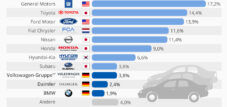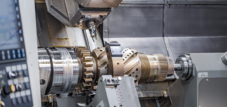Published on: May 1, 2025 / update from: May 1, 2025 - Author: Konrad Wolfenstein

Punctuality in beer transport: Warsteiner reaches 99%, while Deutsche Bahn can only dream of 62.5% - picture: xpert.digital
Warsteiner shows that this is how rail transport works with 99 % punctuality
Logistics in comparison: Warsteiner's model as a model for rail traffic
While Deutsche Bahn is fighting for long -distance transport with a punctuality rate of only 62.5 percent (the year 2024 in total), the Warsteiner brewery with its own train system reaches an impressive punctuality of almost 99 percent on its routes to Hamburg and Munich. This remarkable difference raises questions about the organization of rail freight transport. The Warsteiner Group, which has operated its own container terminal at the production site since 2005, has developed an efficient system for beer transport, which not only serves its own needs, but also offers logistics solutions for third -party companies. In contrast, Deutsche Bahn suffers from an outdated infrastructure, intensive construction activity and high network utilization, which regularly leads to delays. Warsteiner's success shows that efficient rail transports in Germany are possible if the right conditions are created.
Suitable for:
- Du logistics² | Double dual-use logistics: integration of rail and street for civil and military purposes
The Warsteiner Zug: a model of punctuality
The Warsteiner brewery has developed an impressive logistics system that is characterized by exceptional reliability. With a punctuality rate of almost 99 percent on the routes from Warstein to Munich and Hamburg, the company sets standards in German rail freight transport. This performance is all the more remarkable when you consider that the Warsteiner Zug is not only used for the transport of beer products, but also for the transportation of goods from other companies.
Since 2005, the Warsteiner group has had its own container terminal at the Warstein production site, which serves as a hub for intermodal traffic. With five weekly departures to Hamburg (Monday to Friday), the terminal offers a reliable alternative to street -bound transports and thus circumvents typical problems such as traffic jams on the A1 or A2, driver lack and increasing toll costs. This strategic decision for its own terminal was part of a long -term logistics strategy that is bearing fruits today.
Motivation for punctuality from an incidental interest
A central success factor of the Warsteiner train system is corporate philosophy. Daniel Küster, Supply Chain Director of the Warsteiner Group, explains that his own railway infrastructure is essential, since in addition to the brows of beer, the quick and low-stock distribution of the products is also part of the core business. This connection between production and logistics motivates particularly to punctuality. Küster addresses the particularly high priority of the freshness: the products have to arrive absolutely fresh from the customers, which creates intrinsic motivation for the efficiency of intermodal trains. The freshness of the beers and beer -containing drinks is a crucial competitive advantage that depends directly on the punctuality of the transports.
Intermodal trains are freight trains that are specially designed for the transport of loading units such as containers, alternating containers or saddle trailers, which are transported as part of the so -called intermodal traffic between different transport companies - typically street, rail and ship. The central feature: the transported goods remain in the same loading unit during the entire transport; There is no envelope of the goods itself, but only a change of the transport means of the loading unit.
Deutsche Bahn in the punctuality dilemma
In contrast to Warsteiner's success model, Deutsche Bahn faces considerable challenges regarding punctuality. The numbers speak a clear language:
Current punctuality values of Deutsche Bahn
In March 2025, Deutsche Bahn achieved a company punctuality of only 65.6 percent in long -distance transport. In regional traffic, the values were better at 90.8 percent, but still well below the level of Warsteiner. At DB Cargo, the freight transport division of Deutsche Bahn, punctuality in 2024 was around 68 percent.
In practice, these numbers mean: Almost every third long -distance train and about every fourth freight train of the Deutsche Bahn arrives at his goal with a significant delay. It is particularly problematic that even a more generous scale is created for measuring punctuality in freight transport - only delays of more than 15 minutes are rated there as unpunctuality.
Causes of unpunctuality
The reasons for the weak punctuality of Deutsche Bahn are diverse and structural:
- Bad system state: The outdated and overloaded infrastructure leads to a variety of disorders, especially in the area of the upper building or in old shops. Around 6100 disorders are recorded on the network every day.
- Intensive construction activity: A very high construction volume and short -term construction planning processes burden the operational stability. Especially in highly exposed bottlenecks, the construction process leads to critical route loads and impairments of operating quality.
- High traffic density: Most of the growth of fuss takes place in already heavily loaded traffic nodes such as Hamburg, Frankfurt am Main or Cologne.
- Availability of the vehicles: Of the approximately 400 ICE trains existing, about a quarter is not available or not operational.
- The German rail network has shrunk by around 21 % since 1994, while the transport performance has increased by 91 % in the same period in freight transport in the same period.
These problems reinforce each other and lead to a systematic overload of the rail network, which in turn leads to delays.
Suitable for:
Comparison of systems: What does Warsteiner do differently?
The striking difference in punctuality between Warsteiner and Deutsche Bahn raises the question of what makes the brewery logistics system different. Several factors play a role here:
Specialization and focus
While Deutsche Bahn uses a complex network with a wide variety of train types, routes and customers, Warsteiner can concentrate on a few, specialized connections. The terminal in Warstein mainly serves the routes to Hamburg and Munich, which enables more efficient planning.
Integrated value chain
For Warsteiner, logistics is an integral part of the value chain. The freshness of the products depends directly on the efficiency of the transport, which creates a strong incentive for punctuality. The Deutsche Bahn, on the other hand, acts as an independent company with more complex target structures.
Innovative approaches in intermodal traffic
The Warsteiner Zug is part of a “one-stop shopping solution” that combines flexibility and efficiency. Since October 2017, Fr. Meyer's son has been marketing the capacities on the Warsteiner brewery train system and has stabilized the connection to Hamburg together with partners such as Westfälische Landesisenbahn GmbH.
Time buffer and realistic planning
A possible explanation for the high punctuality could also be in realistic schedule. As a commentator notes in an industry forum: "It is a question of definition. […] The train can still be at the customer with 5 hours delay (according to timetable). These strategic time buffers are an essential factor for reliability.
The economic dimension of punctuality
Punctuality in freight transport is not just a question of service, but also has significant economic effects for everyone involved.
Fresh products and supply chain efficiency
For Warsteiner as a food producer, punctuality is particularly critical. As a discussion participant notes in a forum: "The Leh [food retail] only accepts products if the expiry date/expiry date is still a defined period in the future when the store arrives. If this is not the case, the goods are already rejected in the warehouse". Delays can thus lead to economic losses directly.
Economic challenges for DB Cargo
The Deutsche Bahn, on the other hand, is particularly struggling with economic difficulties in the freight traffic area. DB Cargo has been generating losses for years - a loss of up to 472 million euros is expected for 2024. The traffic performance has dropped by 7.9 percent compared to the previous year at 68.5 billion tons of kilometers in 2024 and has reached the lowest value since 2014.
The EU Commission has also decided that DB Cargo will have to operate profitably by the end of 2026, since the compensation of the losses by the railway group and the federal government will be assessed as a distortion of competition compared to other freight railways.
Future prospects for rail freight transport
Warsteiner's experiences and the challenges of Deutsche Bahn show various perspectives for the future of rail freight transport in Germany.
Sustainability as a driver
Both companies see an important contribution to climate protection in rail freight transport. Daniel Küster from Warsteiner emphasizes: "The more we were moving from the street to rail, the better we reach our environmental and emission goals". This sustainability aspect could still become more important in the future.
Structural reforms at Deutsche Bahn
Deutsche Bahn has presented a flash program called “S3”, which is to increase the punctuality of the long -distance trains to “75 to 80 percent” by 2027. In addition, DB Cargo plans to reduce up to 2,300 jobs as part of a restructuring and to found new business units (steel, automotive, chemistry and raw materials as well as consumer goods) in order to be geared towards customers and to obtain more flexibility.
Innovation in intermodal traffic
The 1st Warsteiner rail conference in 2024 showed that the brewery continues to focus on innovation in transportation. Together with partners such as the right logistics group, sustainable alternatives to the diesel truck were presented there, which, in connection with the rail transport, can form a “consistently sustainable transport chain for the future”.
Suitable for:
- System terminals buffer warehouse: multifunctional buffer bearing zones for containers and complete load trains (semi-trailer/trailer)
Lessons from the Warsteiner success
The impressive punctuality rate of 99 percent of the Warsteiner trains demonstrates that reliable rail freight transport in Germany is possible. Success is based on a combination of strategic decisions, clear focus on core distances, realistic planning and a close connection between production and logistics.
The Warsteiner model offers interesting food for thought for Deutsche Bahn, which is fighting with a significantly lower punctuality. Although the complexity and size of the systems are very different, a stronger focus on specialized corridors and more realistic schedule could also be helpful for the DB.
The challenges in rail freight transport remain significant, but the Warsteiner case shows that with the right approach, remarkable success is also possible under the current framework conditions. At a time when sustainability and climate protection are becoming increasingly important, this could be a decisive advantage for the future of goods transport on the rail.
Suitable for:
We are there for you - advice - planning - implementation - project management
☑️ Our business language is English or German
☑️ NEW: Correspondence in your national language!
I would be happy to serve you and my team as a personal advisor.
You can contact me by filling out the contact form or simply call me on +49 89 89 674 804 (Munich) . My email address is: wolfenstein ∂ xpert.digital
I'm looking forward to our joint project.















